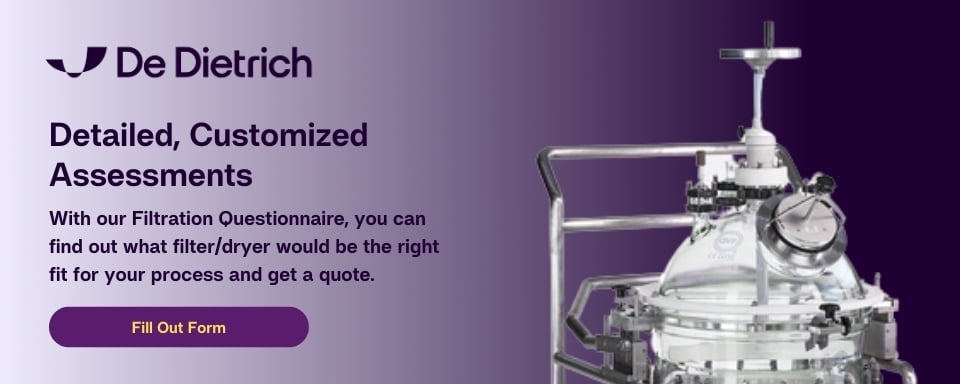Why Should You Perform Filtration Testing?
Hussain Fouad, Sales Engineer at DeDietrich Process Systems, sits down to discuss the value of filtration testing and how DDPS can help. Watch the video or read the transcription below.
What is the value of filtration testing?
In looking at solid-liquid separation, which is what we're going to focus on in this video, the importance of testing is to determine the feasibility of your process as well as optimize your process.
If you're working in solid-liquid separation, where the solid is your product, generally you have a larger solids concentration. So you want to make sure you're able to maximize the amount of solids you're collecting, as well as the purity of your solids, and minimize the waste.
When should you test?
In general, you'd like to do testing whenever you're developing a new process or when you're scaling up an existing process.
What are you testing for?
In general, you're testing for product clarity. You want to make sure that you're getting a pure, clean product, whether it's from the filtration or from the additional rinses and washes you do after the filtration.
You're checking for the filtrate clarity. You want to make sure that you're not getting solids in your filtrate, it's not coming out cloudy.
You're testing for process optimization. You may look at, if you're doing pressure filtration, what's the pressure? Or if you're doing centrifuge, you're looking at what's the rotational speed of the centrifuge. What are those forces? You're going to look at the filtration media used.
If you're getting solid bypass, you may need a finer-rated filter media. Then you're looking at cake thickness. How thick of a cake are you building? How much solids are you collecting?
What might happen if you don't test?
If you don't test, then your process will not be optimized. You may lose solids. You may not get the correct product clarity, and you may have a longer cycle time.
Also, if you're scaling up and you did a different process in the lab scale and at the production scale, you're using a different process, filtration may not work. You may blind your filter media and not be able to filter and not be able to process your materials.
What does testing look like?
Usually, testing is done at the lab scale and data collected from the lab scale is very scalable. So you can take this and use this for your pilot scale or production scale equipment. Normally, when you're doing testing, you're looking for the normal filtration rate versus time. You're looking for the cake height, cake volume. You're looking for the moisture content of the cake, the clarity of the cake, as well as maybe the clarity of the filtrate outlet.
What support does DDPS provide?
We offer support for customers who are doing filtration testing. We can help optimize your process as well as provide feedback on the scale-up. We also have a test facility in our Charlotte, North Carolina office where we can collect samples from customers, do filtration testing, and provide results on the filtration of their material as well as scale-up data.
